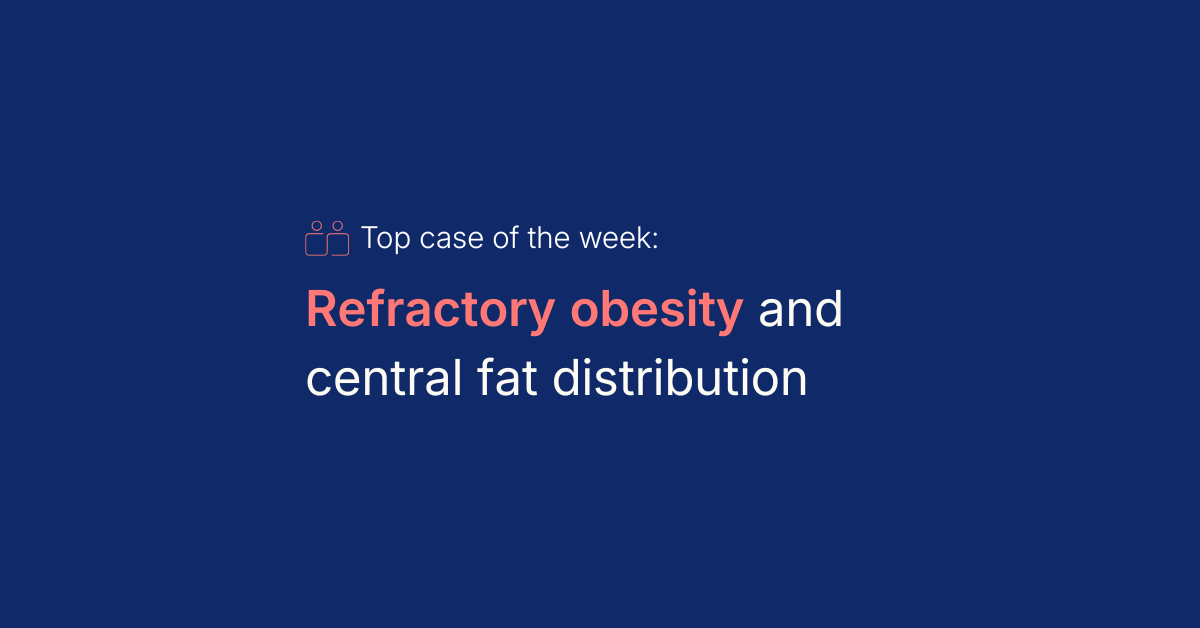
Rethinking refractory obesity workups
When patients struggle to lose weight despite GLP-1 therapy and lifestyle changes, it's time to dig deeper. A refractory obesity workup can uncover hidden endocrine disorders that may be driving resistance to treatment.
From cortisol abnormalities to pituitary dysfunction, understanding when and how to escalate care is key to delivering personalized, effective obesity management.
What diagnostic workups would you consider for this case? Log in or sign up to share your approach and see the Consensus.
Post:
42-year-old female with BMI 45 has been on semaglutide 2.4mg weekly for 8 months with minimal weight loss despite good adherence and dietary counseling. She's lost only 12 pounds from her starting weight of 290 pounds and reports significant hair thinning that began approximately 2 years ago and has worsened over time, causing her considerable distress.
On examination, you notice her weight distribution shows prominent central adiposity with relatively thin extremities, and she mentions increasing fatigue, difficulty sleeping, and mood changes that she initially attributed to frustration with her lack of weight loss progress. Her previous labs showed normal thyroid function and HbA1c, but she's requesting to increase her GLP-1 dose or try a different weight loss medication.



 Questions for consult
Questions for consult
2. How do you approach the evaluation of secondary causes of obesity when first-line pharmacologic interventions are ineffective, and what role do hormonal assessments, including cortisol evaluation, play in this clinical scenario?
3. What factors influence your decision to escalate GLP-1 dosing, switch to alternative weight loss medications, or pursue additional diagnostic testing when patients present with concerning symptoms that suggest underlying endocrine pathology?
 Consults
Consults
Key takeaways about refractory obesity workups and treatments:
- Consider endocrine causes when GLP-1 therapy fails
Persistent obesity with symptoms like fatigue and hair loss may point to conditions such as Cushing’s, acromegaly, or PCOS. Initial labs should include cortisol testing, IGF-1, and nutrient panels. - Hormonal workup is essential in refractory cases
When weight loss stalls despite lifestyle changes and GLP-1 use, reassess sleep, medications, and nutrition. A full hormonal panel can uncover hidden contributors like thyroid dysfunction or pituitary disorders. - Escalate therapy only after ruling out underlying issues
Before increasing GLP-1 dose or switching medications, ensure endocrine pathology is excluded. Decisions should be based on metabolic response and lab findings.
Endocrinology/Diabetes
"1. Cushing’s disease is possible; acromegaly is a consideration. Hypothyroidism is not likely
2. An overnight dexamethasone suppression test and an IGF-1 will be helpful.
3. A lack of significant response after 6 months of GLP-1 therapy will lead me to pursue further testing."
Family Practice
"1. Further testing should include a morning serum cortisol, late-night salivary cortisol, or a 1mg overnight dexamethasone suppression test to evaluate for hypercortisolism. A 24-hour urine free cortisol may also be appropriate. Additional labs could include testosterone, DHEAS, fasting insulin, LH/FSH ratio, ferritin, and vitamin D Levels. Given the hair loss, assessment for iron deficiency, zinc deficiency, and autoimmune markers may also be helpful.
2. When interventions like GLP1 agonists fail, it is essential to reassess lifestyle factors, medication list, and sleep quality. A structured hormonal evaluation can identify conditions such as Cushing's syndrome, PCOS, or hypothalamic pituitary axis dysfunctions.
3. The decision to escalate or switch to GLP1 therapy should depend on the extent of metabolic response and exclusion of underlying endocrine pathology."
Family Practice
"1. I would do a full lab panel, including thyroid, cortisol, and hormone levels. I would also inquire about her lifestyle changes, making sure she is getting at least 120 grams of protein a day and incorporating 3 days a week of resistance training, and trying to get 10,000 steps in a day or most days.
2. Hormonal levels could have an impact, and I would address pending the results.
3. If she isn’t losing weight and if she is doing what is recommended above with the diet/exercise, then I would consider changing to Zepbound."
Family Practice
"1. Check for Cushing’s, hypothyroidism, PCOS.
2. Evaluate hormones, including cortisol, and complete a blood workup.
3. If maxed out on semaglutide, would consider changing to Mounjaro and continue dietary consulting and increasing exercise as able. Also consider what other meds the patient is on, such as antidepressants, which could hinder weight loss."
Endocrinology/Diabetes
"1. A dexamethasone suppression test should be done to rule out Cushing's.
2. I always rule out hypothyroidism and diabetes. I consider Cushing's if the patient appears that way.
3. If the patient can tolerate it, I go as high as needed to get the weight down. Dosage is very individual."
What diagnostic workups would you recommend for refractory obesity? Review the full case on Healthcasts and share your consult.

